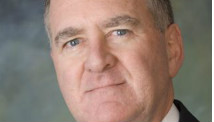PRETORIA, South Africa (AP) — Oscar Pistorius is "numb with shock as well as grief" after the shooting death of his model girlfriend at his home in South Africa, the runner's uncle said Saturday, as his family strongly denied prosecutors' claims that he murdered her.
Arnold Pistorius spoke with The Associated Press and two other South African journalists about his nephew's arrest in the killing of Reeva Steenkamp, who was shot four times on the morning of Valentine's Day. Arnold Pistorius spoke to reporters from the garden of his three-story home in the eastern suburbs of South Africa's capital, Pretoria.
The statement, the first on camera and directly made in person by Pistorius' family, also came out strongly against prosecutors seeking to upgrade the charge against Pistorius to one of premeditated murder, which carries a sentence of life in prison.
"After consulting with legal representatives, we deeply regret the allegation of premeditated murder," Arnold Pistorius said. "We have no doubt there is no substance to the allegation and that the state's own case, including its own forensic evidence, strongly refutes any possibility of a premeditated murder or murder as such."
He said the family was "battling to come to terms with Oscar being charged with murder."
The track star's arrest in the killing of 29-year-old Steenkamp shocked South Africa, where Pistorius was a national hero and icon dubbed the Blade Runner for his high-tech carbon fiber running blades and revered for overcoming his disability to compete at the London Olympics. She was discovered in a pool of blood before dawn Thursday by police called to Pistorius' upscale home in a gated community. Authorities said she had been shot four times, and a 9 mm pistol was recovered at the home.
Pistorius remains held at a police station pending a bail hearing Tuesday. Police have already said they'll oppose Pistorius being released before trial. A premeditated murder charge also makes it more difficult for his defense team to get bail.
On Saturday afternoon, Pistorius' lawyers visited the Brooklyn police station in Pretoria, where the athlete is being held. His younger sister Aimee, who stood alongside Arnold Pistorius when he made his statement, also was at the police station later.
There will be a variety of hearings before Pistorius, 26, could go on trial. In South Africa, there are no juries, so a judge ultimately would decide Pistorius' guilt or innocence, sometimes with the help of two advisers. At an initial hearing Friday, Pistorius sobbed and held his head in his hands at times. He has yet to enter a plea in the case.
The family denial that Pistorius committed murder doesn't necessarily mean that they say he didn't shoot her, as murder is a legal term. Initial speculation immediately after the shooting Thursday suggested that it could have been accidental, though police say they are not currently considering that.
Arnold Pistorius did not discuss the circumstances of the shooting, but said that his nephew and Steenkamp had become very close since they started dating in November.
"They had plans together and Oscar was happier in his private life than he had been for a long time," the uncle said.
As Arnold Pistorius read his statement, Pistorius' sister Aimee stood nearby and broke down in tears at one point. Her uncle stopped reading for a moment to put his right arm around her. Pistorius remains very close with his uncle, a man he once lived with as a teenager.
"Words cannot adequately describe our feelings," his uncle said. "The lives of our entire family have been turned upside down forever by this unimaginable human tragedy and Reeva's family have suffered a terrible loss. As a family we are trying to be strong and supportive to Oscar as any close family would be in these dreadful circumstances."
The entire family was "devastated," Pistorius' uncle said, and was "grieving for Reeva, her family and her friends."
Since news of the killing, shock waves have rippled across South Africa, a nation of 50 million where nearly 50 people are killed each day, one of the world's highest murder rates. U.N. statistics say the nation has the second highest rate of shooting deaths in the world, behind only Colombia. Others have focused their attention on Pistorius and his fascination with fast cars, cage fighting and firearms.
Steenkamp, who graduated from law school, is known in South Africa for appearing in commercials and as a bikini-clad model in men's magazines. On Saturday, South Africa's state broadcaster SABC planned to air a reality TV show featuring the model. Another portion of the show released earlier Saturday included a clip of her swimming with two dolphins, which tap her on the cheek with their snouts.
"I think the way that you go out, not just your journey in life, but the way that you go out and the way you make your exit is so important," the blonde-haired Steenkamp says in the video. "You either made an impact in a positive or a negative way, but just maintain integrity and maintain class and just remain true to yourself.
"I'm going to miss you all so much and I love you very, very much."
___
Jon Gambrell reported from Johannesburg.
___
Gerald Imray can be reached at www.twitter.com/geraldimrayAP . Jon Gambrell can be reached at www.twitter.com/jongambrellAP .


